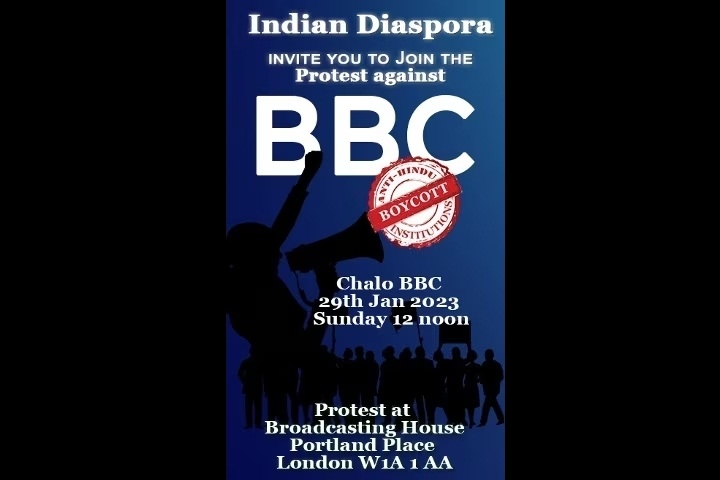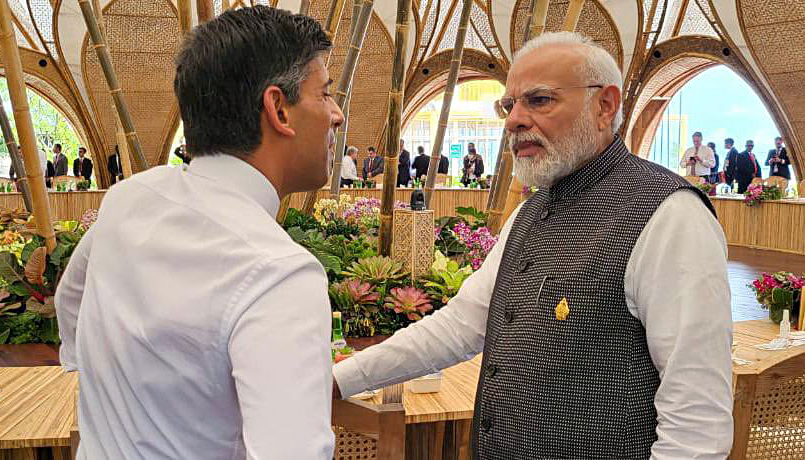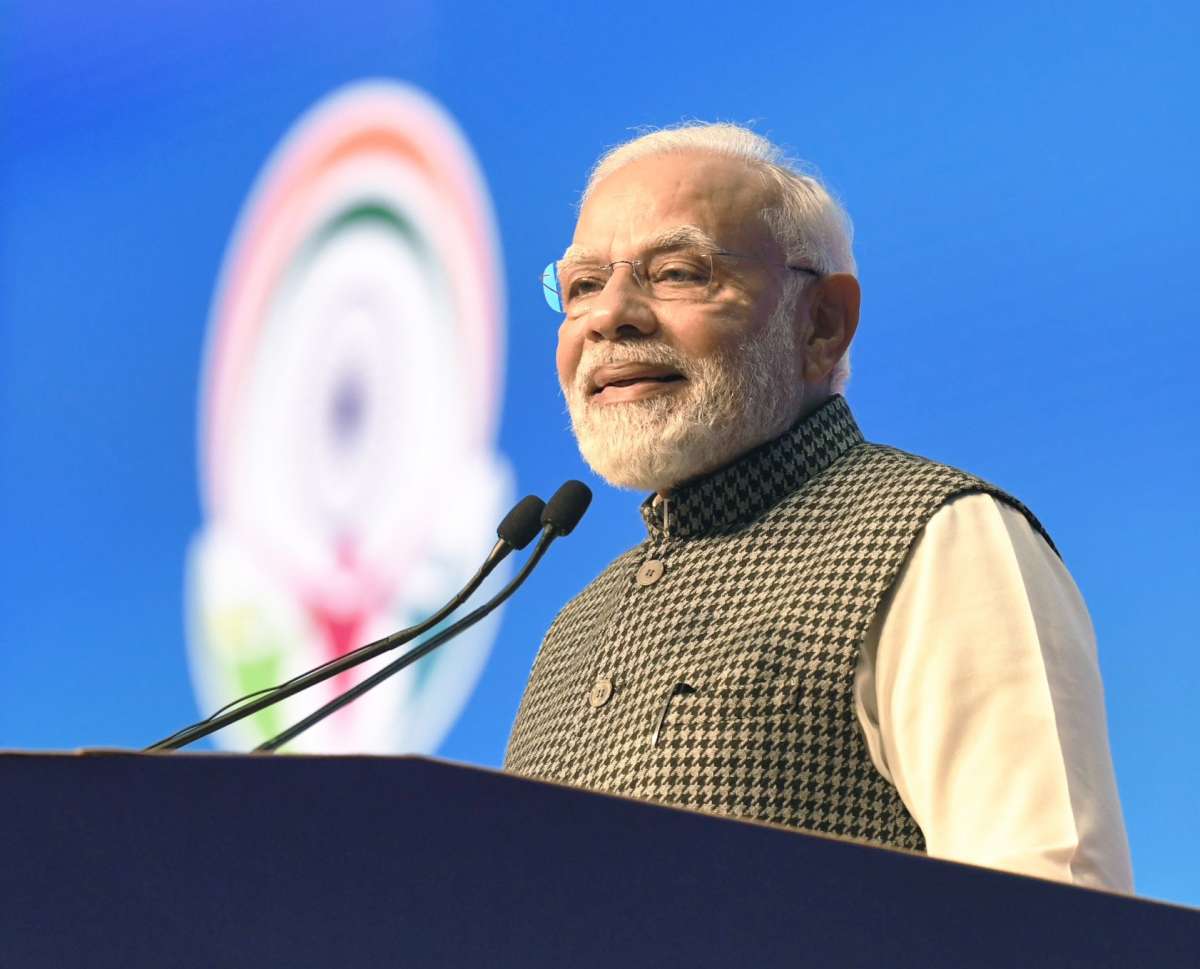The diaspora is agitated as the documentary comes on the heels of weeks of violence in Leicester, the tenth largest city in the UK, a report by Rahul Kumar
The BBC documentary on Indian Prime Minister Narendra Modi has raised a storm among the diaspora. Feeling insulted by the documentary, the Indian diaspora in the UK is holding a protest against the British broadcaster on Sunday afternoon, January 29.
The British Broadcasting Corporation’s documentary, “India: The Modi Question” has raised a storm not just in India but also among the diaspora. Part one of the documentary, which has already been aired on January 17 puts the blame of the Gujarat riots on Modi, who was the state Chief Minister when the riots took place in 2002. Part two will be aired today-January 24.

Looking at the sensitive nature of the documentary, the Indian government has banned it from being shown in the country. It has also been taken off Youtube for its divisive content and for fear of creating hatred between communities over incidents that took place two decades back. Indian courts have already given their verdicts and sentenced people of both communities for the violence.
Riots broke out in Gujarat after a Muslim mob set fire to a coach of the Sabarmati Express at the Godhara station. Fifty-nine Hindus, including women and children were burnt alive in what is known as the Godhara train burning case.
India Narrative spoke with Indians in the UK about their protest and their grievances against the BBC.
London-based consultant, Adit Kothari, who has been active in the diaspora movement says, the British Indian diaspora is enraged, agitated & frustrated with the BBC’s deliberate attempts to run covert and sometimes overt malicious Anti-India and Anti Hindu agendas. While with the protest, we may see no change within the BBC to organisationally address our concerns� but we have to demonstrate our displeasure at the BBCs attitude.
The diaspora is agitated as the documentary comes on the heels of weeks of anti-Hindu violence in Leicester the tenth largest city in the UK. The communal violence, which took the British society and the local police by surprise, was directed at Hindu symbols and homes by the local Muslim youth. Weeks of attacks on Leicester’s Hindus led to many families moving out of the city due to threats and fear.

The Leicester violence against the Hindus was fanned by fake social media posts by Muslims. The misinformation on social media targeted Hindus and instigated Muslim youth to attack Hindus. Many of these fake posts were published by the British mainstream media like The Guardian and the BBC without verifying, leading to independent investigations into the Leicester violence which highlighted the spread of fake news against the local Hindu community.
British Hindus feel that the BBC documentary will create a similar situation in which the Hindus can again be targeted because of biased coverage.
Kothari says: It is important to raise awareness not only within the British Hindu and the Indian diaspora but also among other communities in Britain so that they get aware of this nefarious (anti-Hindu) agenda. Giving an example, the Indian activist says that the BBC has once called Holi a filthy festival and Jai Shree Ram a provocative slogan which has hurt our sentiments.
The activist says that the protest against the BBC is to raise awareness about the BBC failures regarding its journalistic standards and the royal charter-which aims to provide impartial, high quality and distinctive journalism, to its viewers.
The BBC documentary has evoked a strong reaction across Indian society.
Lord Rami Ranger, well known British MP in the House of Lords wrote a letter of condemnation to Tim Davie, BBC Director General, saying, among other things, that the timing of the BBC documentary is sinister considering that India and the UK are working for a free trade agreement, India has assumed the presidency of G20 and the UK has an Indian-origin prime minister.
In his letter, Lord Ranger says: The producer has shown a lack of vision, common sense and judgment by producing such an insensitive one-sided documentary.
In India too, dozens of bureaucrats, retired officers and judges have written an open letter dubbing the BBC documentary as delusions of British Imperial resurrection.
Many other individuals have launched petitions on the website change.org asking for an independent investigation into the BBC’s actions. Many smell a conspiracy as the diverse nation of nearly 1.4 billion people goes to elections in 2024, saying that the BBC is trying to queer the pitch against Modi.
A petition against the BBC has also been raised in the British parliament, seeking investigation into the anti-Hindu propaganda and hatred attacks on Hindu community
This will be the UK diaspora’s second protest against the BBC is barely three months. The earlier one was related to the BBC’s Hinduphobic” coverage of the Leicester violence.
(The content is being carried under an arrangement with indianarrative.com)
ALSO READ: Jaishankar hails Vajpayee’s post-Pokhran diplomacy

Leave a Reply